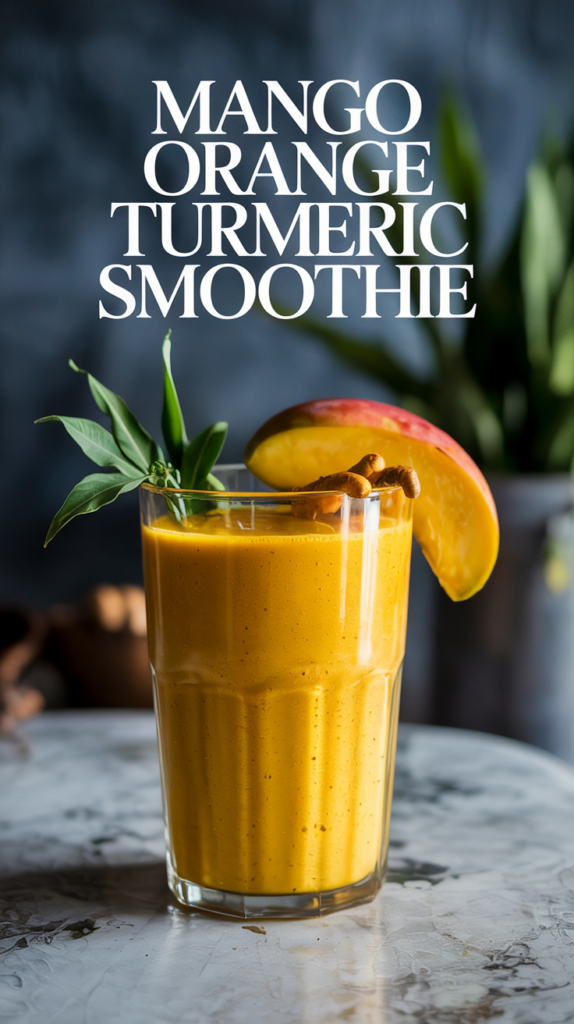Mango Orange Turmeric Smoothie: A Vibrant Blend for Immunity and Energy
Introduction to the Mango Orange Turmeric Smoothie
Looking for a bright, anti-inflammatory smoothie to energize your mornings or recharge after a workout? The Mango Orange Turmeric Smoothie combines tropical fruits, vibrant roots, and plant-based nutrients to deliver a refreshing burst of flavor and wellness benefits. Packed with immune-boosting vitamins, antioxidants, and anti-inflammatory compounds, this smoothie supports digestion, skin health, and sustained energy. Below, we’ll detail the recipe, precise portions, and science-backed health benefits of each ingredient. Plus, we’ll include calorie counts and customization tips to suit your dietary needs.
Mango Orange Turmeric Smoothie Recipe
Ingredients and Portions
Here’s what you’ll need for one serving (approximately 16 oz):
- Fresh or frozen mango: 1 cup (chopped)
- Blood or regular orange: 1 medium (peeled and segmented)
- Ripe banana: 1 medium (peeled)
- Lemon juice: 1 tbsp (freshly squeezed)
- Superfood turmeric root or powder: 1/2 tsp (powder) or 1-inch piece (fresh root)
- Manitoba Harvest hemp hearts: 1–2 tbsp
- Carrots: 1/2 cup (shredded or chopped)
- Unsweetened almond milk: 1 cup
- Ice cubes: 1/2 cup
Preparation Instructions
- Add all ingredients to a high-speed blender.
- Blend on high for 45–60 seconds until smooth and creamy.
- Pour into a glass and enjoy immediately for maximum freshness.
Total calories per serving: ~340–430 calories (exact count below).
Health Benefits of the Mango Orange Turmeric Smoothie
This smoothie is a nutritional powerhouse. Let’s break down the science-backed benefits of each ingredient:
1. Fresh or Frozen Mango (1 cup)
- Calories: 99 kcal
- Key Nutrients: Vitamin C, vitamin A (as beta-carotene), folate, and fiber.
- Health Benefits:
- Immune support: One cup provides 67% of the daily vitamin C requirement, crucial for fighting infections [1].
- Skin health: Beta-carotene converts to vitamin A, promoting skin repair and reducing UV damage [2].
- Digestive aid: Fiber content (3g per cup) supports gut regularity [3].
2. Blood or Regular Orange (1 medium)
- Calories: 62 kcal
- Key Nutrients: Vitamin C, folate, potassium, and flavonoids.
- Health Benefits:
- Antioxidant-rich: Flavonoids like hesperidin reduce oxidative stress and inflammation [4].
- Heart health: Potassium helps regulate blood pressure, lowering cardiovascular risk [5].
3. Ripe Banana (1 medium)
- Calories: 105 kcal
- Key Nutrients: Potassium, vitamin B6, and resistant starch.
- Health Benefits:
- Muscle function: Potassium prevents cramps and supports nerve signaling [6].
- Mood boost: Vitamin B6 aids serotonin production, enhancing mental well-being [7].
4. Lemon Juice (1 tbsp)
- Calories: 4 kcal
- Key Nutrients: Vitamin C, citric acid.
- Health Benefits:
- Detoxification: Citric acid enhances liver enzyme activity, aiding toxin removal [8].
- Iron absorption: Vitamin C increases non-heme iron uptake from plant-based foods [9].
5. Turmeric (1/2 tsp powder or 1-inch root)
- Calories: 5 kcal
- Key Nutrients: Curcumin (active compound), manganese.
- Health Benefits:
- Anti-inflammatory: Curcumin blocks inflammatory pathways, easing joint pain and chronic inflammation [10].
- Brain health: Linked to improved memory and reduced risk of neurodegenerative diseases [11].
6. Manitoba Harvest Hemp Hearts (1–2 tbsp)
- Calories: 90–180 kcal
- Key Nutrients: Complete protein, omega-3s, magnesium.
- Health Benefits:
- Plant-based protein: 10g per 3 tbsp supports muscle repair and satiety [12].
- Heart health: Omega-3s lower triglycerides and improve cholesterol ratios [13].
7. Carrots (1/2 cup)
- Calories: 25 kcal
- Key Nutrients: Beta-carotene, vitamin K1, biotin.
- Health Benefits:
- Eye health: Beta-carotene converts to vitamin A, protecting vision [14].
- Skin glow: Antioxidants combat free radicals that accelerate aging [15].
8. Unsweetened Almond Milk (1 cup)
- Calories: 30–40 kcal
- Key Nutrients: Vitamin E, calcium (if fortified).
- Health Benefits:
- Dairy-free hydration: Low-calorie base ideal for lactose intolerance [16].
- Bone support: Fortified versions provide 45% of daily calcium needs [17].
9. Ice Cubes (1/2 cup)
- Adds a chilled texture without calories.

Why This Smoothie Works for Immunity and Inflammation
Anti-Inflammatory Powerhouse
Turmeric’s curcumin and mango’s antioxidants work synergistically to reduce inflammation, making this smoothie ideal for arthritis sufferers or post-workout recovery.
Customization Tips
- Extra protein: Add a scoop of vanilla plant-based protein powder.
- Spice it up: Include 1/4 tsp black pepper to boost curcumin absorption [18].
- Sweetness adjust: Replace banana with 1/4 cup Greek yogurt for lower sugar.
Conclusion: Embrace the Golden Glow Lifestyle
The Mango Orange Turmeric Smoothie is a delicious, science-backed way to fuel your body with anti-inflammatory compounds, vitamins, and plant-based protein. Perfect for boosting immunity, enhancing skin health, or starting your day with energy, this recipe is as versatile as it is nutritious. Share your creations with #GoldenGlowSmoothie and tag @ManitobaHarvest to showcase your vibrant blends!
Bibliography
- USDA – Mango Nutrition
- NIH – Vitamin A and Skin Health
- Mayo Clinic – Dietary Fiber
- NCBI – Citrus Flavonoids
- American Heart Association – Potassium
- NIH – Potassium
- NIH – Vitamin B6
- Healthline – Lemon Juice Benefits
- NIH – Vitamin C and Iron
- NCBI – Curcumin and Inflammation
- Healthline – Turmeric Benefits
- Manitoba Harvest – Hemp Hearts Nutrition
- NIH – Omega-3 Fatty Acids
- NIH – Beta-Carotene
- NCBI – Carotenoids and Skin
- Healthline – Almond Milk
- NIH – Calcium
- NCBI – Curcumin Bioavailability



